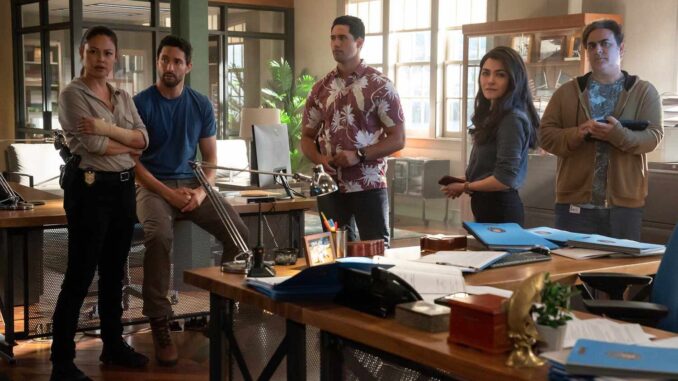
In April 2024, CBS made the unexpected decision to cancel NCIS: Hawai’i after just three seasons. The show, which debuted in 2021, was a spin-off of the popular NCIS franchise and featured Vanessa Lachey as the first female lead in the series. Despite its strong viewership, the cancellation left fans and cast members alike in shock.
The Abandoned Studio: A Visual Testament to the Show’s End
Actor Jason Antoon, who portrayed Ernie Malik on the series, recently shared a poignant video on social media. The footage revealed the once-bustling Hawaii Film Studio in Honolulu now lying dormant, overtaken by weeds and neglect. Antoon described the site as “empty and full of weeds,” highlighting the stark contrast to the vibrant set that once brought the series to life.
The Economic Impact on Hawaii’s Film Industry
The cancellation of NCIS: Hawai’i has had significant repercussions for Hawaii’s local economy. The show employed approximately 350–400 people, including actors, crew members, and local vendors. With the series’ end, many have found themselves out of work, and businesses that relied on the production are facing financial strain.
CBS’s Decision: A Business Perspective
CBS executives cited several reasons for the show’s cancellation. High production costs associated with filming in Hawaii, coupled with the network’s desire to refresh its programming lineup, were primary factors. Additionally, the introduction of new series within the NCIS franchise, such as NCIS: Origins, contributed to the decision.
Cast Members Reflect on the Show’s Legacy
The cast of NCIS: Hawai’i has expressed their feelings about the show’s abrupt end. Vanessa Lachey, in particular, shared an emotional message on social media, stating she was “gutted, confused, blindsided” by the cancellation. She also expressed gratitude for the experience and the opportunity to portray the franchise’s first female lead.
The Future of Filming in Hawaii
With the cancellation of NCIS: Hawai’i and other productions like Magnum P.I., Hawaii faces the challenge of maintaining its status as a prime filming location. The state’s film industry is now advocating for increased tax incentives to attract future productions and mitigate the economic impact of these cancellations.
Fan Reactions and Campaigns
Fans of the series have not remained silent in the face of the cancellation. Petitions and social media campaigns have emerged, urging CBS to reconsider its decision. While these efforts have garnered attention, the network has yet to reverse its stance.
The Show’s Cultural Impact
Beyond its entertainment value, NCIS: Hawai’i held cultural significance. The series showcased Hawaii’s diverse landscapes and highlighted the importance of representation in media. Its cancellation has sparked discussions about the need for more inclusive storytelling in television.

Conclusion: Aloha to NCIS: Hawai’i
The end of NCIS: Hawai’i marks the conclusion of a chapter in both television history and Hawaii’s film industry. While the show’s cancellation was a business decision, its impact resonates with fans, cast members, and the local community. As the Hawaii Film Studio stands empty, it serves as a reminder of the transient nature of the entertainment industry and the lasting impressions left by beloved series.
FAQs
1. Why was NCIS: Hawai’i cancelled?
CBS cited high production costs and the desire to refresh its programming lineup as primary reasons for the show’s cancellation.
2. How many people were employed by NCIS: Hawai’i?
The series employed approximately 350–400 individuals, including actors, crew members, and local vendors.
3. Has the Hawaii Film Studio been used for other productions?
Yes, the Hawaii Film Studio has been the filming location for other notable series like Lost, Hawaii Five-0, and Magnum P.I.
4. Are there any plans to revive NCIS: Hawai’i?
As of now, CBS has no plans to revive the series or continue its storyline.
5. How can fans support future productions in Hawaii?
Fans can advocate for increased tax incentives for the film industry in Hawaii and support local initiatives aimed at attracting new productions to the state.